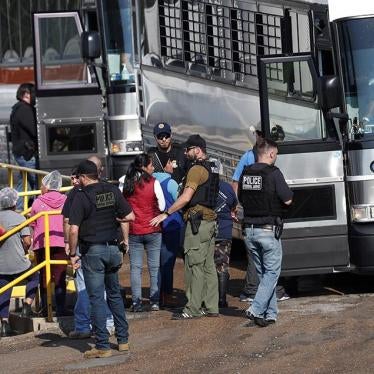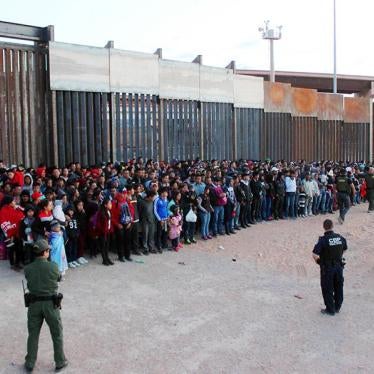Lauren Alder Reid
Assistant Director
Office of Policy
Executive Office for Immigration Review
5107 Leesburg Pike, Suite 2616
Falls Church, VA 22041
August 15, 2019
RE: EOIR Docket No. 19-0504
Dear Ms. Reid:
We are writing to state Human Rights Watch’s opposition to the joint interim final rule, Asylum Eligibility and Procedural Modifications (EOIR Docket No. 19-0504), published by the Department of Justice and Department of Homeland Security in the Federal Register on July 16, 2019.
Human Rights Watch is a non-profit, non-governmental human rights organization that investigates allegations of human rights violations in more than 90 countries around the world, including in the United States, and advocates for laws and policies that ensure respect for those rights.
The interim final rule would seriously undermine the right to seek asylum provided for in international law and would leave Central Americans who would otherwise qualify as refugees without effective protection. The interim final rule is also inconsistent with the Immigration and Nationality Act and should be rescinded.
The regulation would potentially return asylum seekers to third countries that are not safe.
Under existing US law, in conformity with international law and practice, US immigration authorities may return an asylum seeker to a third country that has a formal readmission agreement with the United States and where the asylum seeker would not be persecuted and would have access to a full and fair asylum procedure.
The US-Canada Safe Third Country Agreement is the only such agreement that the US government has concluded and implemented with a third country. It states that both parties to the agreement are “determined to safeguard for each refugee status claimant eligible to pursue a refugee status claim who comes within their jurisdiction, access to a full and fair refugee status determination procedure as a means to guarantee that the protections of the [Refugee] Convention, [its] Protocol, and the Torture Convention are effectively afforded.”
If a country is unwilling to agree formally to that guarantee of “a full and fair refugee status determination procedure” to an asylum seeker transferred to it from the United States or unable to provide such protections in practice, the United States should not consider that third country as safe.
As INA 208(a)(2)(A) indicates, a formal agreement, while necessary, is not sufficient to guarantee safety. Even if a country—such as Guatemala—were to agree to examine claims of transferred asylum seekers, the United States would still be required by the terms of the statute to make its own assessment of the capacity and willingness of that state to afford the transferee a full and fair refugee status determination.
The US has the capacity to fairly and efficiently adjudicate asylum claims and the rule risks transferring this responsibility to countries with less capacity, jeopardizing the rights of asylum seekers. For example, Guatemala is one of the major source countries for asylum seekers to the United States, the fourth highest nationality in 2017.[1] Guatemala lacks the institutional capacity to examine the refugee claims of potentially tens of thousands of people who could be returned if the United States sent back to Guatemala all asylum seekers who had passed through Guatemala en route to the United States. On August 2, 2019, the New York Times reported that Guatemala’s institute responsible for examining asylum claims had a staff of eight that processed 262 cases in 2018, 20 of which were approved, with 234 cases still pending at the time of the report.[2]
With respect to Mexico, the background to the interim final rule, at page 38, provides statistics showing a recent dramatic increase in the number of asylum claims. The Mexican government received 8,789 asylum applications in 2016 but 29,623 applications in 2018. The background note on the rule says “Mexico [is] on track to receive more than 50,000 asylum applications by the end of 2019 if that quarterly pace continues.” What the background to the interim rule does not say is whether the staffing of COMAR, Mexico’s agency responsible for examining asylum claims, has kept pace. Multiple reports, summarized by the New York Times, show that COMAR is not adequately staffed and that its staff is not adequately trained to adjudicate the increased caseload.[3] In addition, asylum seekers encounter physical dangers while waiting for claims to be processed there (or in the United States, under the Migration Protection Protocols).[4] A recent Washington Post report documents kidnappings and other abuses suffered by Central American asylum seekers in Mexico.[5]
We also take issue with the statement on pages 17-18 of the notice of the interim final rule that it is “consistent with the purpose of the statutory firm-resettlement bar (8 U.S.C. 1158(b)(2)(A)(vi)).” A refugee who is firmly resettled is one who has sought and been offered permanent protection by a third state, not a person who might theoretically have been able to lodge an asylum claim that the receiving state might have had the will and capacity to fully and fairly examine. That Congress expressly made firm resettlement a bar to asylum admissibility clearly shows its intent that anything short of a guarantee of permanent protection or other durable solution for refugees in or by a third country would not be sufficient to consider that country safe and to render an asylum claim from a third country national arriving from that country inadmissible. This is consistent with international standards on effective protection required in the context of a safe third country transfer. UNHCR states, “Where she or he is entitled to protection, a right of legal stay and a timely durable solution are also required.”[6]
The regulation is inconsistent with the statute
Quoting from the Federal Register notice of this rule, at page 17: “Congress specified that the Attorney General “may provide by regulation for any other conditions or limitations on the consideration of an application for asylum,” so long as those limitations are “not inconsistent with this chapter.” INA 208(d)(5)(B), 8 U.S.C. 1158(d)(5)(B).” The same notice, at page 14, says: “Congress amended section 208 of the INA, 8 U.S.C. 1158, to include the asylum provisions in effect today: Among other things, Congress designated three categories of aliens who, with limited exceptions, are ineligible to apply for asylum: (1) aliens who can be removed to a safe third country pursuant to a bilateral or multilateral agreement.”
This interim final rule is clearly inconsistent with the statute, which requires “a bilateral or multilateral agreement” with a “safe third country.”
The interim final rule contravenes the right to seek asylum and potentially would result in great harm to asylum seekers and refugees and is inconsistent with the statute. For these reasons, Human Rights Watch expresses its opposition to the interim final regulation and urges the Departments of Justice and Homeland Security to withdraw it.
Sincerely,
Bill Frelick
Director
Refugee Rights Program
Nicole Austin-Hillery
Executive Director
US Program








